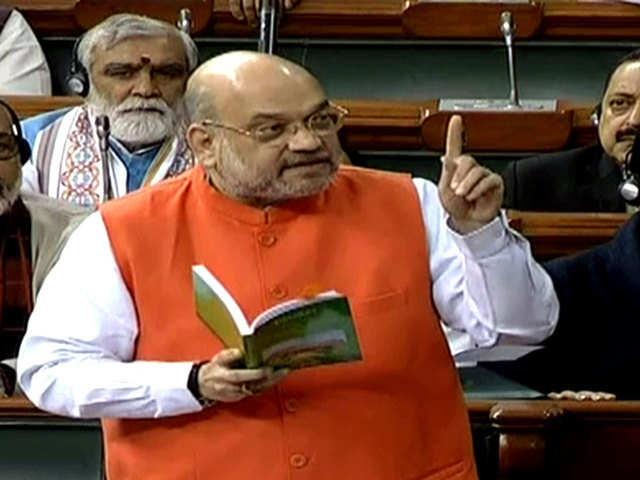Citizenship Amendment Bill has endorsement of India's 130 crore citizens: Amit Shah
Trying to allay apprehensions of people of the Northeast, Shah said the Narendra Modi Government is committed to protect the customs and culture of people of the region and informed that Manipur will be brought under Inner Line Permit regime, wher...
by PTI
NEW DELHI: Union Home Minister Amit Shah on Monday asserted that the Citizenship (Amendment) Bill has the "endorsement of 130 crore Indian citizens" and rejected suggestions that the measure is anti-Muslim, saying it will give rights to persecuted minorities from Pakistan, Bangladesh and Afghanistan.
Trying to allay apprehensions of people of the Northeast, Shah said the Narendra Modi Government is committed to protect the customs and culture of people of the region and informed that Manipur will be brought under Inner Line Permit regime, where the proposed law will not be applicable.
The bill, which has been opposed by the Congress, Trinamool Congress and other opposition parties, was introduced after a division of votes for which 293 MPs voted in favour and 82 against it.
"Citizenship amendment bill has the endorsement of 130 crore citizens of the country as it was the part of the BJP manifesto in 2014 as well as 2019 Lok Sabha elections," Shah said, initiating the debate on the contentious bill.
"We will have to differentiate between intruders and refugees. Citizenship amendment bill does not discriminate against anyone and does not snatch anyone's rights," he said.
The home minister said under the proposed legislation, citizenship will be granted to refugees coming from the three countries after facing religious persecution there even without documents, including ration cards.
Noting that India has given similar rights to people in the past, Shah said Manmohan Singh and L K Advani could become prime minister and deputy prime minister respectively due to this after they came from present day Pakistan.
"This bill is not even .001 per cent against Muslims. It is against infiltrators," he said earlier while introducing the bill.
According to the Citizenship (Amendment) Bill, 2019, members of Hindu, Sikh, Buddhist, Jain, Parsi and Christian communities, who have come from Pakistan, Bangladesh and Afghanistan, till December 31 2014, facing religious persecution there, will not be treated as illegal immigrants but given Indian citizenship.
Shah said as per the bill, it will not be applicable to the tribal areas of Assam, Meghalaya, Mizoram or Tripura as included in the Sixth Schedule to the Constitution and in the areas covered under The Inner Line, notified under the Bengal Eastern Frontier Regulation, 1873.
Currently, the ILP regime is applicable in in Arunachal Pradesh, Nagaland and Mizoram.
The bill says such refugees will be given Indian citizenship after residing in India for five years (six years in CAB 2016), instead of 11 years earlier.
The bill also proposes to give immunity to such refugees facing legal cases after being found as illegal migrants.
Opposition leaders Adhir Ranjan Chowdhury, Saugata Roy, N K Premchandran, Gaurav Gogoi, Shashi Tharoor and Assaduddin Owaisi opposed the introduction of the bill, saying it was violative of various provisions of the Constitution, including move to grant citizenship on the basis on religion.
While defending the introduction of the bill, the home minister said the Congress had "divided" the country on the basis of religion that is why it was necessary to bring the bill.
Shah said the proposed legislation is being brought on the basis of reasonable classifications provided under the Constitution.
The home minister said laws were framed to give citizenship to people on several occasions in the past, including in 1971 after the creation of Bangladesh and attacks on Indians in Uganda, by using the provision of reasonable classifications.
Opposing the bill, Congress MP Manish Tewari said the bill is "unconstitutional" and "contrary to the spirit of the Constitution which is secular".
"Equals cannot be treated as unequal. When a person comes to India, he is a refugee. You cannot discriminate against him on the basis of religion," he said during the debate.
Supporting the bill, BJP MP Rajender Agarwal said the country cannot ignore the suffering of the people who have come here after facing religious persecution.
He said Pakistan has failed to protect its minorities under the Nehru-Liaquat pact.
The Bill says, "On and from the date of commencement of the Citizenship (Amendment) Act, 2019, any proceeding pending against a person under this section in respect of illegal migration or citizenship shall stand abated on conferment of citizenship to him.
"Provided that such person shall not be disqualified for making application for citizenship under this section on the ground that the proceeding pending against him and the central government or authority specified by it in this behalf shall not reject his application on that ground if he is otherwise found qualified for grant of citizenship under section."
The bill also says: "Provided further that the person who makes the application for citizenship under this section shall not be deprived of his rights and privileges to which he was entitled on the date of receipt of his application on the ground of making such application".
The bill proposes to incorporate a sub-section (d) to Section 7, providing for cancellation of Overseas Citizen of India (OCI) registration where the OCI card-holder has violated any provision of the Citizenship Act or any other law in force.
However, the cancellation order shall not be passed unless the OCI card-holder has been given a reasonable opportunity to be heard. This amendment was also proposed in the 2016.
The BJP-led NDA government had introduced the bill in its previous tenure and got Lok Sabha's approval. But it did not introduce it in Rajya Sabha, apparently due to vehement protests in the Northeast.
That bill lapsed following the dissolution of the last Lok Sabha.